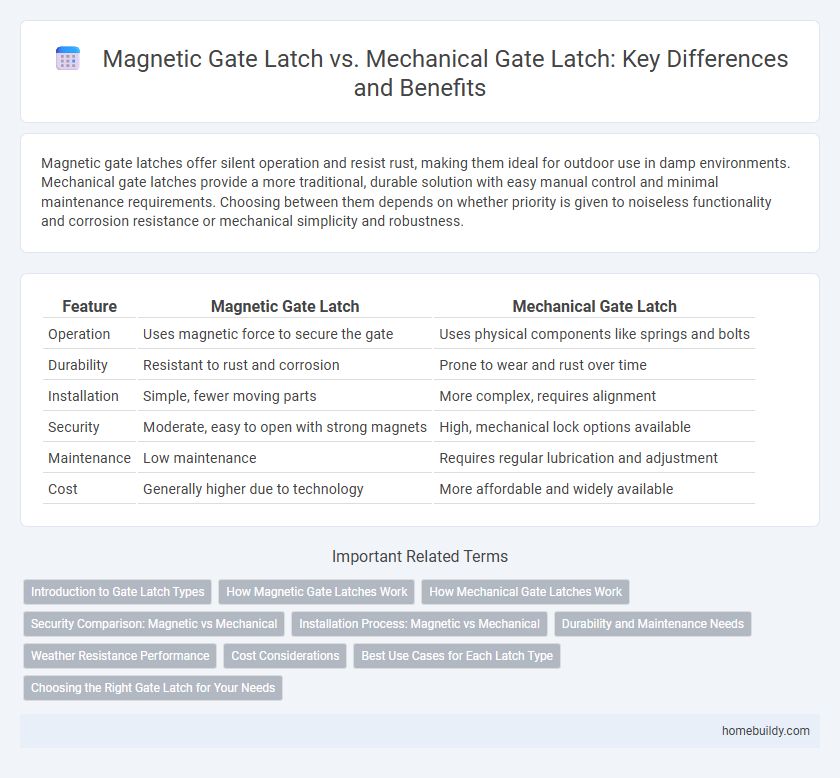Magnetic gate latches offer silent operation and resist rust, making them ideal for outdoor use in damp environments. Mechanical gate latches provide a more traditional, durable solution with easy manual control and minimal maintenance requirements. Choosing between them depends on whether priority is given to noiseless functionality and corrosion resistance or mechanical simplicity and robustness.
Table of Comparison
| Feature | Magnetic Gate Latch | Mechanical Gate Latch |
|---|---|---|
| Operation | Uses magnetic force to secure the gate | Uses physical components like springs and bolts |
| Durability | Resistant to rust and corrosion | Prone to wear and rust over time |
| Installation | Simple, fewer moving parts | More complex, requires alignment |
| Security | Moderate, easy to open with strong magnets | High, mechanical lock options available |
| Maintenance | Low maintenance | Requires regular lubrication and adjustment |
| Cost | Generally higher due to technology | More affordable and widely available |
Introduction to Gate Latch Types
Magnetic gate latches utilize powerful magnets to secure gates, offering silent operation and resistance to rust, making them ideal for outdoor use in humid or wet environments. Mechanical gate latches depend on physical components like springs and catches, providing a traditional, cost-effective solution with straightforward installation and maintenance. Choosing between magnetic and mechanical types depends on factors such as environmental conditions, desired durability, and ease of use.
How Magnetic Gate Latches Work
Magnetic gate latches operate using a powerful magnet and an armature plate that securely holds the gate closed without the need for mechanical locking components, reducing wear and maintenance. Unlike mechanical latches that rely on physical bolts or springs, magnetic latches use magnetic force to create a silent, automatic closure, enhancing security and ease of use. This technology is ideal for gates requiring frequent access and minimal vibration, common in residential and commercial fencing systems.
How Mechanical Gate Latches Work
Mechanical gate latches operate through a simple, manually engaged mechanism that secures gates by sliding or rotating a latch bolt into a catch or striker plate. This system relies entirely on physical components such as springs, levers, or gravity to hold the gate closed without the need for external power sources. Compared to magnetic gate latches, mechanical versions provide reliable, durable security in various weather conditions without potential interference from magnetic fields or power failures.
Security Comparison: Magnetic vs Mechanical
Magnetic gate latches offer enhanced security through tamper-resistant designs and lack of external keyholes, reducing vulnerability to picking and unauthorized access. Mechanical gate latches rely on physical bolts or locks, which can be susceptible to forceful entry or lock-picking techniques. Advanced magnetic latches often integrate with electronic access systems, providing higher levels of controlled entry and auditing capabilities compared to traditional mechanical options.
Installation Process: Magnetic vs Mechanical
Magnetic gate latches feature a straightforward installation process requiring alignment of magnets and minimal hardware, often reducing labor time and complexity. Mechanical gate latches demand precise alignment of moving parts and typically involve screws, bolts, and hinges, which can extend installation duration and require more tools. Choosing between the two impacts ease of setup, with magnetic latches offering quicker, tool-light installation compared to the more involved mechanical latch setup.
Durability and Maintenance Needs
Magnetic gate latches offer superior durability due to their corrosion-resistant materials and fewer moving parts, reducing wear and tear compared to mechanical gate latches. Mechanical gate latches often require frequent lubrication and adjustment to maintain functionality, leading to increased maintenance needs over time. The low-maintenance nature of magnetic latches makes them ideal for harsh weather environments, ensuring longer-lasting performance with minimal upkeep.
Weather Resistance Performance
Magnetic gate latches excel in weather resistance due to their sealed design, preventing rust and corrosion caused by rain or humidity. Mechanical gate latches, often made of metal components with exposed moving parts, are more susceptible to wear and deterioration from prolonged exposure to harsh weather conditions. Choosing a magnetic latch ensures longer durability and reliable performance in outdoor environments with varying climates.
Cost Considerations
Magnetic gate latches typically have a higher upfront cost due to the inclusion of magnets and specialized components, but they often reduce long-term maintenance expenses by minimizing wear and tear. Mechanical gate latches tend to be more affordable initially, using simpler materials like metal or plastic, yet they may incur additional costs over time from frequent repairs or replacements. Budget planning for gate latch installation should weigh the initial investment against potential durability and maintenance savings specific to each latch type.
Best Use Cases for Each Latch Type
Magnetic gate latches excel in environments requiring hands-free or automatic closing, such as residential gates, pool fences, and access points needing secure yet convenient operation. Mechanical gate latches are best suited for heavy-duty applications like farm gates, industrial sites, and high-security perimeters where durability and manual control are paramount. Selecting the right latch depends on factors like gate material, frequency of use, and security requirements.
Choosing the Right Gate Latch for Your Needs
Magnetic gate latches offer effortless operation and enhanced security by using strong magnets that hold the gate firmly closed without physical locks or keys. Mechanical gate latches provide reliable, traditional locking mechanisms ideal for heavy-duty gates and high-traffic areas, ensuring durability and manual control. Selecting the right gate latch depends on factors like gate material, frequency of use, security requirements, and environmental exposure to balance convenience and protection.
magnetic gate latch vs mechanical gate latch Infographic

 homebuildy.com
homebuildy.com